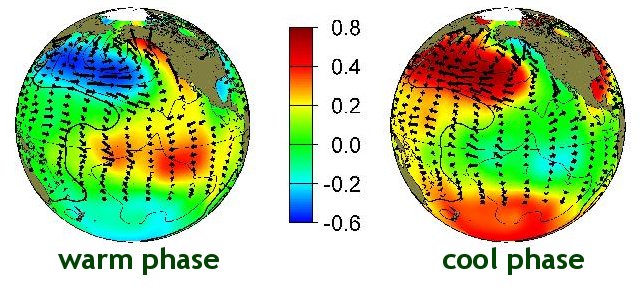Pacific Decadal Oscillation PDO
Related Topics |
Pacific Decadal Oscillation PDO |
The Pacific Decadal Oscillation (PDO) is the predominant source of inter-decadal climate variability in the Pacific Northwest. Like ENSO, PDO is characterized by changes in sea surface temperature, sea level pressure, and wind patterns. The PDO is described as being in one of two phases: a warm phase and a cool phase. The warm phase of PDO favors anomalously warm sea surface temperatures near the equator and along the coast of North America, and anomalously cool sea surface temperatures in the central North Pacific. The cool phase for PDO has the opposite pattern of SST anomalies. Each PDO phase typically lasts for 20-30 years. Detailed information and the latest condition of the PDO can be found at https://www.ncei.noaa.gov/access/monitoring/pdo/.
The influence of PDO on the summer rainfall in southern China (and Hong Kong) can be found in the paper "Regime Shift in Summer Rainfall in Southern China" prepared by HKO staff. Moreover, the tropical cyclone activity in the South China Sea is likely to be modulated by PDO as shown in the HKO's paper "Variations in Tropical Cyclone Activity in the South China Sea".
|
|
|
